Public Call to EU Institutions and Member States
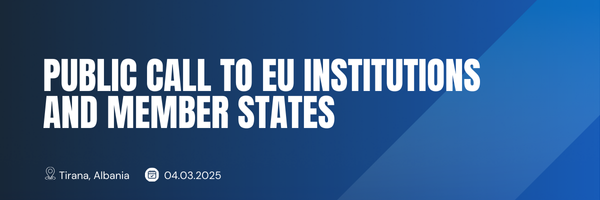
We, a group of active civil society organizations in Albania, committed to the democratic, social, and economic development of our country and its European integration, call on the institutions of […]
Public Consultation with Civil Society Organisations on the preparation of the Civil Society Facility and Media Programme 2024-2025
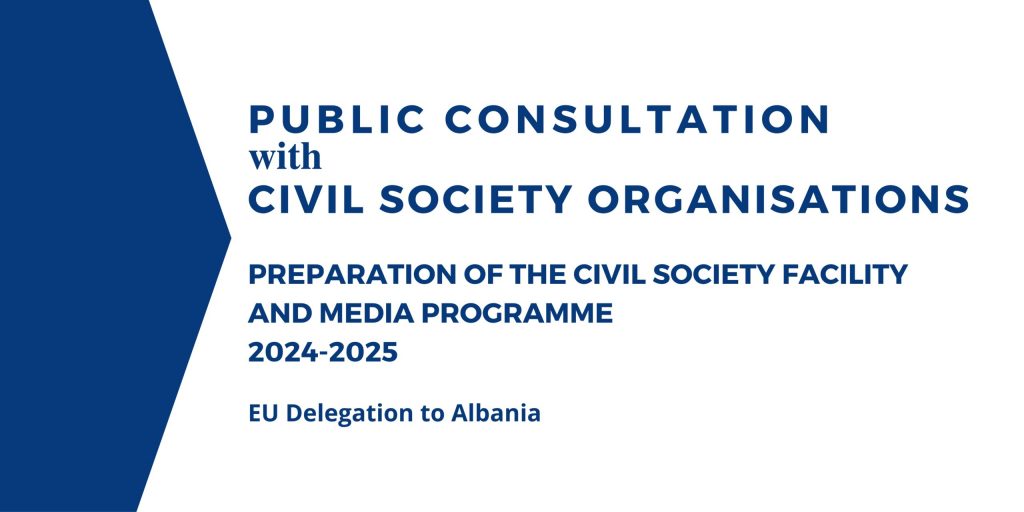
The EU Delegation to Albania would like to consult CSOs on the needs of civil society and media in Albania.
Below some guiding questions for your contributions:
- In your views, which are the priority sectors or important topics that should be included in the upcoming calls for proposals of the IPA Civil Society Facility and Media Programme 2024-2025 for Albania?
- In your views, what should be the minimum and maximum budget for a project to give results and have an impact?
- In your views, what should be the minimum duration for a project to give results and have an impact?
- In your views should financial support to third parties be included in the Programme and what should be its proportion?
- Any other suggestions
All contributions must be submitted in written via email by 17 February 2023 at 16:00 DELEGATION-ALBANIA-CSF-2024-25@eeas.europa.eu
Public Consultations for the European Commission’s 2021 Annual Report on Albania
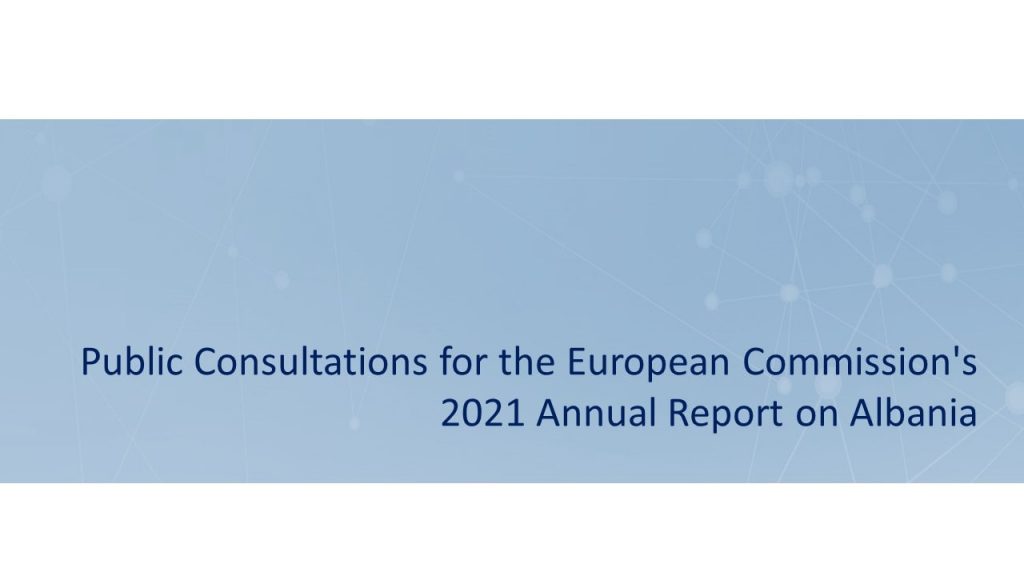
Every year, the Delegation of the European Union in Albania is preparing the Annual Report of Albania 2021. The structure of the Annual Report of 2021 will be the same as the Report of 2020.
During April 2021, the EU Delegation organized a three-day consultation with civil society organizations on Albania’s Annual Report 2021. About 100 CSOs representatives, shared with the EU Delegation their views and assessment of
the country’s performance in key areas of democracy and fundamental rights, rule of law, and various chapters of the acquis communautaire – the body of EU law.
As part of the consultation, the National Resource Center presented all the developments of recent months, especially regarding the legal framework affecting the sector, focusing on the Draft Law “On registration of non-profit organizations”, the numerus problematic issues in this regard and lack of progress in implementing the measures of the Roadmap of civil society etc.
Furthermore, based on the invitation for written opinions, an extended information on the above issues was send to the EU Delegation by the Resource Center. Every year, the European Commission adopts its strategic document for the enlargement area. It assesses each country’s progress and sets out the way forward, as well as recommendations for the coming year. This year’s report from the Commission to the Council will be published in Autumn 2021. Read more
[gallery size="medium" ids="eyJ1cmwiOiJodHRwczpcL1wvcmVzb3VyY2VjZW50cmUuYWxcL3dwLWNvbnRlbnRcL3VwbG9hZHNcLzIwMjFcLzA3XC8xNzM0Nzg5NzBfMzgwODkzOTk0NTg0MjQ0N18zODI3NDg0NjEyMzM3NTI0Njk0X24uanBnIiwidGl0bGUiOiIxNzM0Nzg5NzBfMzgwODkzOTk0NTg0MjQ0N18zODI3NDg0NjEyMzM3NTI0Njk0X24iLCJjYXB0aW9uIjoiIiwiYWx0IjoiIiwiZGVzY3JpcHRpb24iOiIifQ==,eyJ1cmwiOiJodHRwczpcL1wvcmVzb3VyY2VjZW50cmUuYWxcL3dwLWNvbnRlbnRcL3VwbG9hZHNcLzIwMjFcLzA3XC8xNzM5MDM4NzZfMzgwODk0MDE3MjUwOTA5MV83Njc4NDYzNTk4MzMzMzY2NTA4X24uanBnIiwidGl0bGUiOiIxNzM5MDM4NzZfMzgwODk0MDE3MjUwOTA5MV83Njc4NDYzNTk4MzMzMzY2NTA4X24iLCJjYXB0aW9uIjoiIiwiYWx0IjoiIiwiZGVzY3JpcHRpb24iOiIifQ=="]
Public Statement
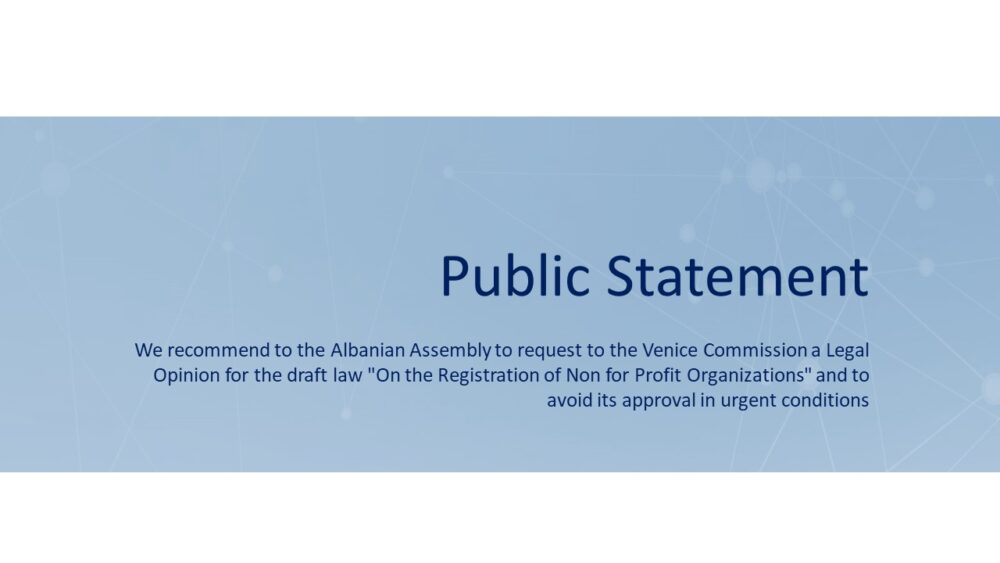
26 February, 2021
Public Statement
We recommend to the Albanian Assembly to request to the Venice Commission a Legal Opinion for the draft law “On the Registration of Non for Profit Organizations” and to avoid its approval in urgent conditions
The Commission of Legal Issues, Public Administration and Human Rights of the Assembly of Albania, organized on 24th of February 2021, a hearing session on the draft law “On the registration of Non for Profit Organizations” with civil society organizations representatives.
Being confident that the Assembly does not approve any legal initiative proposed by the executive but performs its important functions in accordance with the Constitution and in compliance with the principle of check and balance of powers, civil society organizations representatives addressed a request to the Assembly for organizing of this hearing session in October 2020, while the hearing session was organized only now, and furthermore one day after the approval of the draft law in principle by the Law Commission.
The initiative for a new law is very positive and welcomed by civil society organizations, which have been requesting it for years, but we note with regret that the attitude of state institutions responsible for drafting, proposing and reviewing this draft law has been exclusionary toward a sector such as of the civil society in the country, which is directly affected by it.
The consultation process was organized in the absence of a climate that guarantees inclusiveness, transparency, effective consultation and discussion in good faith.
We would like to inform the public opinion that when the initiative was drafted by the Ministry of Justice, representatives of civil society organizations were invited to provide their comments to this draft law only in the final stage of the process, after the fact that it was effectively finalized and within a period of 7 days, that does not meet the minimum requirements of the law “On notification and public consultation”, where stakeholders must have at least a one month period of consultation. Despite the short consultation deadlines, the NPO representatives offered their input in this process, but the Ministry of Justice reflected a very low number of suggestions and did not provide explanations for the reasons or arguments for rejecting the other ones.
At the hearing session in the Law Commission organized on February 24th, the discussions by representatives of CSOs highlighted a number of principle issues that the draft law has. With regret, we note that the statements articulated during the hearing session by members of the Law Commission have biased and prejudiced tones towards the sector.
The Ministry of Justice and the Assembly presented that this draft law addresses the MoneyVal recommendations of the Council of Europe while the issues raised by the civil society sector are not related to issues of the MoneyVal recommendations.
We oppose provisions in draft law that create an uncertain and vague situation for the civil society sector and that may put the sector under pressure of unfair and intimidating attacks, especially those organizations that monitor and aim to increase state institutions’ accountability and responsibility.
We would like to clarify to both the public opinion and the Assembly as well, that the civil society sector does not oppose any provision aimed at preventing or combating terrorism or terrorist financing through the activities of civil society organizations.
We also specify that even with the legal framework in force, every non-profit organization has the obligation to report to the tax institutions.
In the draft law proposed by the Council of Ministers, we note that there are provisions for which earlier, the Venice Commission has expressed substantial reservations in its 2014 opinion on the legislation of Azerbaijan, finding it in violation of international standards https://rm.coe.int/1680306ff8 . In this opinion the Venice Commission found that the proposed changes in the legislation of Azerbaijan have a chilling effect in the non-profit organization and that the discretion of supervising by the public authorities is unlimited nor clearly define in a explicit manner.
Following the hearing session on 24 February 2021, after presenting to the Commission all the above issues, we were invited by the Commission to a working meeting on 26 February 2021 to continue the discussions on the issues raised.
Appreciating the readiness of the Commission to organize this meeting, a representative of the group of organizations participated in the meeting on February 26th, where on behalf of the group were submitted comments on the draft law and stressed again to the Commission representatives that as long as the draft law has a number of issues in principle, cannot be discussed article by article.
As above, considering the great importance and impact that this legal initiative has on civil society organizations which must exercise their mission in accordance with all international standards sanctioned in the Conventions to which our country has acceded and which provide for freedom of organization, we recommend to the Assembly:
- To not approve the proposed draft law in the conditions of an emergency that undermines the effective consultation with civil society organizations as the main stakeholder and group of interest;
- To request to the Venice Commission a Legal Opinion for the draft law, regarding the compliance of this draft law with European standards and international experience in the fields of democracy, human rights and the rule of law.
Based on the previous experience of the Assembly to consult with the Venice Commission for initiatives of special importance such as the draft law “On the legislative initiative of voters in the Republic of Albania”, the legal initiative for vetting in politics, constitutional amendments in the frame of the justice system reform, the draft law “On guaranteeing the integrity of the persons elected, appointed, or that exercise public functions”, etc., we hope that this request of 119 civil society organizations will be taken into consideration and to give an opportunity to a body above the parties, as it is The Venice Commission to give a legal opinion on the compliance of this draft law with international standards.
(in alphabetical order)
A.L.T.R.I Center
Academy of European Integration and Negotiations
Academy of Political Studies
Agropuka Association
Albanian Association of Italian Language Teachers (A.P.A.D.I)
Albanian Association of PJHA
Albanian Center for Population and Development (ACPD)
Albanian Centre for Economic Research (ACER)
Albanian Centre for Environment Governance – (ACEG)
Albanian Consumer Centre
Albanian Disability Rights Foundation (ADRF)
Albanian Helsinki Committee
AlbContact Center
ALERT Center
Alliance against Discrimination of LGBT, Albania
Alpin Association
ARSIS, Social Organization for Youth Support
Association Action for Change and Transformation –ACT
Association BID Berat
Association for Democratic Culture
Association For Women and Children
Asta Organization
AWEN-Albanian Women Empowerment Network
Balkan Investigative Reporting Network – BIRN Albania
Beekeepers Association of Tirana
Beyond Barriers Association
Center for Bridging Communities
Center for Labor Rights
Center for Social Advocacy
Center for the Study of Democracy and Governance (CSDG)
Centre for Community Development “Today for the Future”
Centre for Parliamentary Studies
Centre Legal Civic Initiative
Child Rights Centre Albania (CRCA)
Civic Forum of Selenica
Civil Right Defenders Albania
Community Reporters Albania
Consulting and Development Partners
Cooperation and Development Institute
Co-PLAN Institute for Habitat Development
Counseling Center for People with Disabilities
Counseling Line for Boys and Men
Counseling Line for Women and Girls
Different & Equal
Dorcas Aid International Albania
Ecological Club, Elbasan
Ekolëvizja Group
Environmental Center for Development Education and Networking (EDEN)
Epoka e Re Center
Euro Partners Development
European Movement Albania
For Social and Environmental Welfare” Berat.
Forum for Free Thought
Gender Alliance for Development Center (GADC)
Gender, Peace and Security Association
GLV Integrimi
GO2 Organization for Sustainable Urban Planning
Hand to Hand Against Nation Apathy – “H.A.N.A” Center
Help the Life Association
Human Dimension Organization
Human Right in Democracy Center
Information Centre Aarhus, Shkodra (AIC)
Information Network and Active Citizenship (INAC)
Institute for Democracy and Mediation
Institute for Development and Civic Initiatives
Institute for Development and Research Alternatives (IDRA)
Institute for Policy & Legal Studies (ISPL)
Institute for Political Studies
Institute of Roma Culture in Albania
International Solidarity Association (SHIS)
International Voluntary Projects, PVN
Liburnetik Association
Light Steps Women Centre
Local Democracy Agency
Missionaries of Social Rights, Kuçovë
My History blog
National Association for Integration and Development (SHKIZH)
National Association of Social Workers
National Centre for Community Services
Natural Resources Development Organization
North Green Association
Observatory for Children and Youth Rights
Open Doors Center
Open Horizon Association
Open Society Foundation Albania
Partners Albania for Change and Development
Patients with Chronic Diseases in Albania Network
People First Association
Professional Business and Craft Association of Albania
Protection of the Natural Environment – Vlora
Psycho-Social Centre “Vatra”
Puka Beekeeper Association
Puka Youth Centre
Ray of Hope Organization
Resource Environmental Center – Albania (REC Albania)
Roma Active Albania
Roma and Egyptian Youth Movement
Shelter for Girls and Women
Social Contract Institute
The association “Social Center to Help People in Need” Fushë-Arrëz
The Association “Udhëtim i Lirë – Liberi di Viaggiare”
The Center for Protection of Natural Ecosystems in Albania, EcoAlbania
The Door
The Women’s Democracy Network Albania (WDN-Albania)
Tirana Legal Aid Society (TLAS)
Treja Center
Useful to Albanian Women
Vizion OJF Association
Voice of Roma in Albania
Walk in My Shoes Organization
Well Point Association- Care for all
Women in Development organization
Women in Public Service Albania Center
Women to Women
Women towards Integration Organization
YMCA Tirana
Youth Activities Centre
Youth Center Perspektiva
Youth Voice Network
Public Statement of Civil Society Organizations in Albania
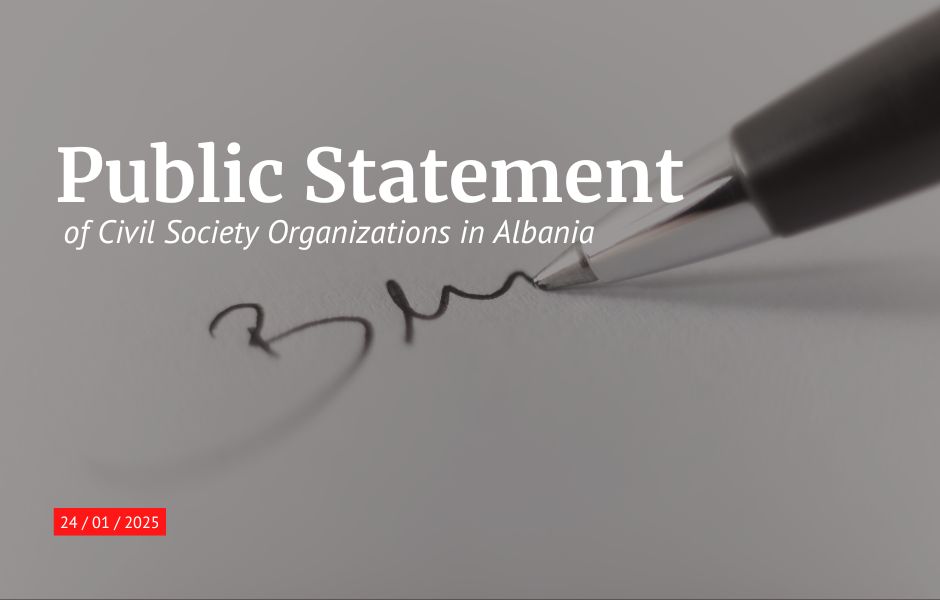
Public Statement of Civil Society Organizations in Albania January 24th, 2025 Following the detention and expulsion from Serbia on January 22, 2025, of 14 activists and civil society representatives, including […]
Reaction of civil society organizations regarding the draft law on the registration of non-profit organizations
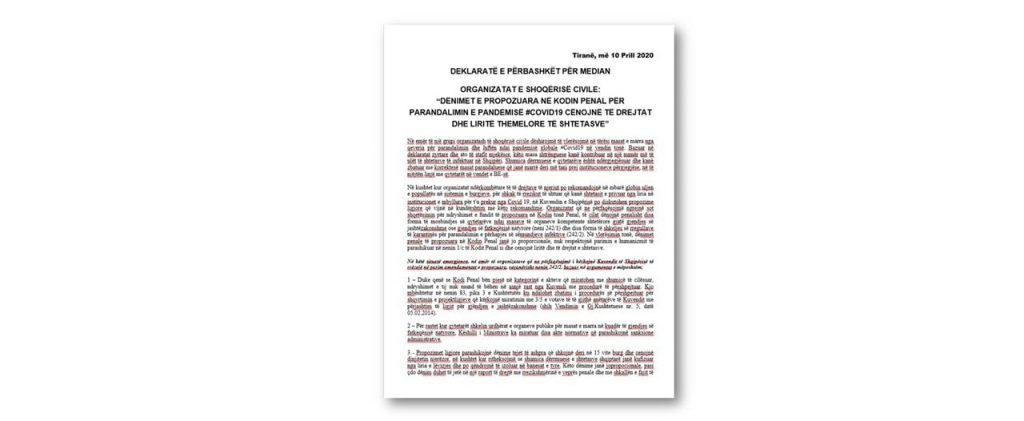
On July 10, the Ministry of Justice published in the Electronic Register for Notification and Public Consultation the draft law “On the registration of non-profit organizations”. The accompanying report of the draft law mentions the institutions that have contributed to its drafting. We find very concerning that in this group of institutions, the civil society organizations were not mentioned, because they were acquainted with the draft law only after its publication for consultation, while special attention should have been paid to their involvement in the drafting process.
The initiative to revise the Law, introduce a simpler and more efficient registration procedure for NPOs and create an electronic register is positive, however, the draft law brings many changes which are a concern for civil society organizations, as well as ambiguities which are needed to be clarified in order for the law to function better.
The National Resource Centre and Partners Albania immediately initiated a consultation process with civil society organizations to discuss the draft law and come up with concrete recommendations in its regard. Through an open letter addressed to the institutions responsible for drafting the law, as well as information to donors and international organizations in the country, 27 civil society organizations, part of the consultation process, expressed their concern about the draft law and their opinion and recommendations on principle and articles of the law. For more read here: The Open Letter and Comments and Suggestions on the Draft Law
In response to the request of civil society organizations, a meeting was organized at the Ministry of Justice with representatives of the Directorate of the Codification and a representative from the group of CSOs, where all problematic issues of the law and relevant suggestions were presented. The comments and suggestions of the CSOs were accepted by the representatives of the Ministry, who committed themselves to review of the draft based on what was discussed and suggested.
Regional and Global Reflections on CSO Accountability in the Balkans
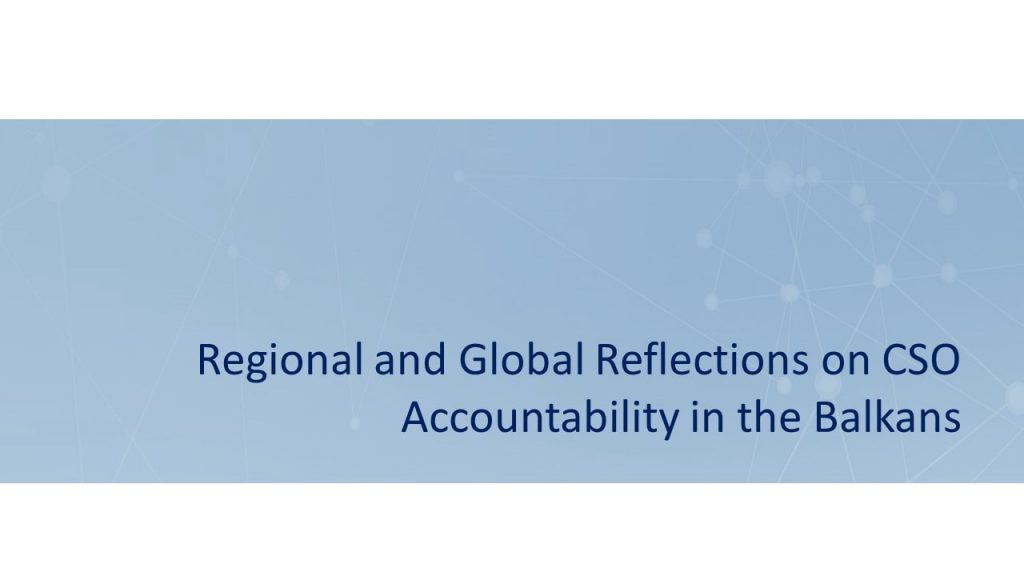
On 1st July 2021, BCSDN held a regional workshop on CSO Accountability: “Reflections on the Self-Regulation of Civil Society by Sharing Regional and Global Experiences”. The event was followed by more than 60 CSOs representatives from the Balkans and across the world, who virtually discussed and shared examples of the CSO accountability practices and self-assessment mechanisms. The workshop aimed to raise awareness among CSOs in the region about the key principles, opportunities, and challenges they should consider in developing and implementing self-regulatory mechanisms for being more effective, accountable, and credible.
The second part of the workshop was devoted to stories on creating and institutionalizing the self-assessment mechanisms in Albania and N. Macedonia. Practical examples of how self-regulation mechanisms can improve the quality of social services provided by CSOs were also provided. As part of the discussion in this panel,
Ms. Ariola Agolli, Manager of the National Resource Center in Partners Albania, shared her experience with the development of the Code for NPOs in Albania, highlighting the importance of a participatory process with extensive involvement in the preparation of the Code, the main principles, commitments of the Code, its functioning and implementing structures. The panelists and discussants then focused on some of the challenges in these processes and practices as well as the ongoing need for capacity building and support of organizations to raise their standards and to be part of such initiatives at the national level and to further recognized international good practices. For more here.
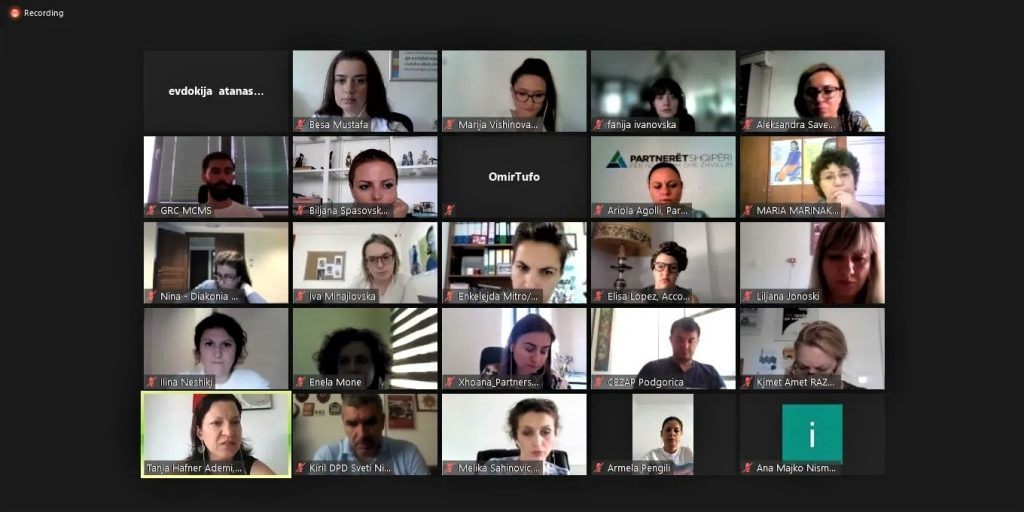
Regional Community Resilience Forum
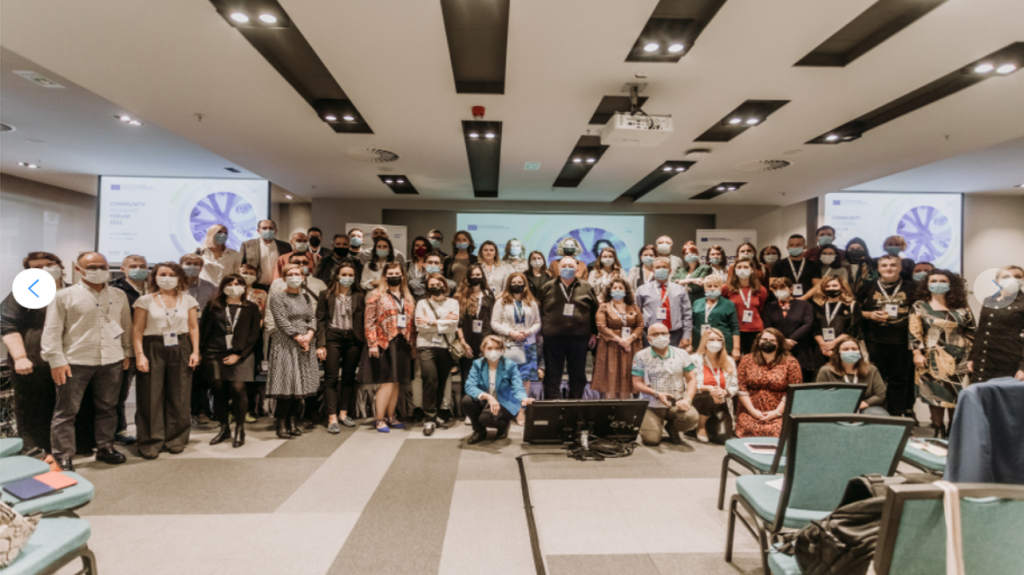
On 20-21 October, 2021, TACSO 3 organized in Belgrade, the Regional Forum “Community Resilience”, with the participation of 117 representatives of community foundations, grassroots, CSOs providing grants and capacity building for grassroots, representatives of the DG NEAR and Delegations from the region, donors, experts and other stakeholders in the area of civil society development in the Western Balkans region and Turkey.
The Forum addressed one of the most critical issues facing civil society presently – CSOs relation with constituencies and genuine activism.
Thematic panels created a space for discussion among all stakeholders in the region on issues such as: factors that affect a sustainable and resilience community; supporting communities to recover; identifying community needs; recognition of beneficiaries and supporters of CSOs; patterns of community activism; Community philanthropy etc as well as good practices of CSOs in support of vulnerable groups in times of crisis. Albania was represented in this Forum, with several representatives of CSOs, who contributed to the thematic panels and discussions, bringing the Albanian perspective on this issue. For more
[gallery size="full" ids="eyJ1cmwiOiJodHRwczpcL1wvcmVzb3VyY2VjZW50cmUuYWxcL3dwLWNvbnRlbnRcL3VwbG9hZHNcLzIwMjFcLzExXC9QaWN0dXJlMy5wbmciLCJ0aXRsZSI6IlBpY3R1cmUzIiwiY2FwdGlvbiI6IiIsImFsdCI6IiIsImRlc2NyaXB0aW9uIjoiIn0=,eyJ1cmwiOiJodHRwczpcL1wvcmVzb3VyY2VjZW50cmUuYWxcL3dwLWNvbnRlbnRcL3VwbG9hZHNcLzIwMjFcLzExXC9QaWN0dXJlMi5wbmciLCJ0aXRsZSI6IlBpY3R1cmUyIiwiY2FwdGlvbiI6IiIsImFsdCI6IiIsImRlc2NyaXB0aW9uIjoiIn0=,eyJ1cmwiOiJodHRwczpcL1wvcmVzb3VyY2VjZW50cmUuYWxcL3dwLWNvbnRlbnRcL3VwbG9hZHNcLzIwMjFcLzExXC9QaWN0dXJlMS0xLWUxNjQ0MTg5MDQ0NDg4LnBuZyIsInRpdGxlIjoiUGljdHVyZTEiLCJjYXB0aW9uIjoiIiwiYWx0IjoiIiwiZGVzY3JpcHRpb24iOiIifQ==,eyJ1cmwiOiJodHRwczpcL1wvcmVzb3VyY2VjZW50cmUuYWxcL3dwLWNvbnRlbnRcL3VwbG9hZHNcLzIwMjFcLzExXC8yNDY3MzY1NDRfMTAxNTg2NDI4MTU4NzMwMTRfNzE2NDE5OTQ4MTczNjcwMTQ1Nl9uLmpwZyIsInRpdGxlIjoiMjQ2NzM2NTQ0XzEwMTU4NjQyODE1ODczMDE0XzcxNjQxOTk0ODE3MzY3MDE0NTZfbiIsImNhcHRpb24iOiIiLCJhbHQiOiIiLCJkZXNjcmlwdGlvbiI6IiJ9,eyJ1cmwiOiJodHRwczpcL1wvcmVzb3VyY2VjZW50cmUuYWxcL3dwLWNvbnRlbnRcL3VwbG9hZHNcLzIwMjFcLzEwXC9waTQuanBnIiwidGl0bGUiOiJwaTQiLCJjYXB0aW9uIjoiIiwiYWx0IjoiIiwiZGVzY3JpcHRpb24iOiIifQ==,eyJ1cmwiOiJodHRwczpcL1wvcmVzb3VyY2VjZW50cmUuYWxcL3dwLWNvbnRlbnRcL3VwbG9hZHNcLzIwMjFcLzEwXC8yNTc3MzEzMDVfMTAxNTg2OTEwMjIxNjMwMTRfMTk0NzE5NzI2NDYzNjUzNzg3NV9uLmpwZyIsInRpdGxlIjoiMjU3NzMxMzA1XzEwMTU4NjkxMDIyMTYzMDE0XzE5NDcxOTcyNjQ2MzY1Mzc4NzVfbiIsImNhcHRpb24iOiIiLCJhbHQiOiIiLCJkZXNjcmlwdGlvbiI6IiJ9"]
Regional Forum “Access to Services during the pandemic, with a special focus on marginalized groups”
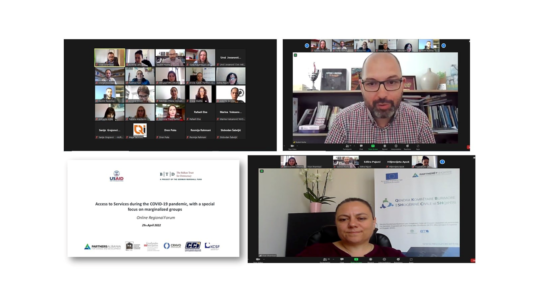
The Kosovar Foundation for Civil Society organized a regional forum on April 29, 2022, with the topic: “Access to Services during the pandemic, with a special focus on marginalized groups.” The goal of this event was to discuss the impact of the pandemic on marginalized groups, the role of civil society organizations and the government’s pandemic response. Most importantly, understand how government policies and CSOs affected the daily lives of citizens from disadvantaged groups.
The forum was divided into three sessions:
– Session 1: Opening remarks;
– Session 2: The disproportional impact of the COVID-19 pandemic on marginalized groups and government’s response;
– Session 3: Civil Society advocacy efforts to improve access to education for marginalized groups during the COVID-19 pandemic.
The discussion began with the opening remarks delivered by the Executive Director of KCSF, Taulant Hoxha, who addressed the guest speakers and panelists by providing a brief summary of the advocacy efforts of the civil society during the last two years of the COVID-19 pandemic. Afterward, Ariola Agolli, Manager of the National Resource Centre at Partners Albania for Change and Development, talked about the main objectives of the project (Fostering regional cooperation and policy responses in times of crises) as well as the importance of organizing thematic regional forum as part of the project. In addition, Ms. Agolli emphasized the need and importance to share best CSO practices.
The topic of the first-panel discussion was “The disproportional impact of the COVID-19 pandemic on marginalized groups and government’s response.” This discussion focused on the disproportional impact on marginalized groups and the most affected group/community during the COVID-19 pandemic. Moreover, the discussion focused on the government’s response and the type of assistance that the government provided to marginalized groups. The last part of the discussion was oriented toward the role of the CSOs and their impact. In particular, the discussion had a special focus on the cooperation and communication between CSOs and the government.
The first panel discussion consisted of four panelists: Adile Shaqiri, Head of Social Services Division at the Ministry of Finance, Labor, and Transfers of Kosovo; Adelina Berisha, Program Manager at the Kosovo Women’s Network; Gresa Stublla, Provider of physiotherapeutic services at HANDIKOS, and Adelajda Alikaj, Executive Director at Streha NGO in Albania.
Adile Shariri reported a significant increase in domestic abuse, with women and children as the most affected group. Similarly, she stated that there has been an increase in demand for social services provided by the Ministry. The second panelist, Adelina Berisha, argued that the state and respective institutions should be more prepared when dealing with global crises such as COVID-19 because the burden falls always on women. She also argued that the cooperation between the Ministry and CSOs has been minimal. Furthermore, Gresa Stublla provided a brief background on the impact of the pandemic on people with disabilities. She argued that people with disabilities found it extremely difficult to live their lives during the past two years, especially at a time when the Government imposed physical distancing and curfews, as people with disabilities should often be accompanied by a second person to assist them with their needs. Finally, Adelina Alikaj, joined from Albania and provided her perspective on LGBTIQ. She said that the number of people that were offered sanctuary drastically went down, which seriously impacted their advocacy efforts. However, on a positive note, she stated that “Streha” provided online psychological services.
The second and final panel discussion focused on: “Civil Society advocacy efforts to improve access to education for marginalized groups during the COVID-19 pandemic.” This discussion had a niche focus on primary and secondary education in marginalized communities. In particular, the discussion focused on online schooling and children’s needs. Moreover, the panelists elaborated on the role of CSOs toward improving access to education for marginalized groups, specifically, their fundraising campaigns to purchase technological equipments for online schooling.
Similarly, the second panelist consisted of four panelists: Besmira Thaqi, Officer of the Division of Child Education at the Ministry of Education, Science, Technology, and Innovation of Kosovo; Donjetë Kelmendi, Executive Director at the Coalition of NGOs for Child Protection; Gjina Kacaniku, Project Officer at the Kosovo Center for Distance Education; and Adriatik Hasantari, Executive Director at Roma Active in Albania.
Besmira Thaqi hinted that supplying children with equipment in order to ensure access to online schooling has been difficult. The Ministry did not possess enough funds to provide tablets or laptops for children in need. Donjetë Kelmendi said that children with disabilities have been the most vulnerable group during the pandemic. She argued that the Government’s policy response has been general, instead of tailored policy to accommodate the needs of children with disabilities. On the other hand, Gjina Kacaniku said that the organization she works for has provided a handful of technological equipment for children in need and were able to mitigate some shortages faced by public institutions. Finally, Adriatik Hasantari provided his Albanian perspective on the topic focusing on the Roma community. He stated that the Roma community is not a priority for the Government of Albania because there are small in numbers and do not bring votes. However, he argued that CSOs were able to fill in the vacuum created by the public institutions.
[gallery size="large" columns="4" ids="eyJ1cmwiOiJodHRwczpcL1wvcmVzb3VyY2VjZW50cmUuYWxcL3dwLWNvbnRlbnRcL3VwbG9hZHNcLzIwMjJcLzA1XC9CYW5uZXItc2NhbGVkLWUxNjU3MDA5NTQ5NjQyLmpwZyIsInRpdGxlIjoiQlJBTkRCT09LX0tDU0YiLCJjYXB0aW9uIjoiIiwiYWx0IjoiIiwiZGVzY3JpcHRpb24iOiIifQ==,eyJ1cmwiOiJodHRwczpcL1wvcmVzb3VyY2VjZW50cmUuYWxcL3dwLWNvbnRlbnRcL3VwbG9hZHNcLzIwMjJcLzA1XC8yNzk3NzYzMTRfMjA5MDE0OTY1NzgxMTExOF82MTQzNjIwNTI0MDYzOTM3ODJfbi1lMTY1NzAwOTU2MzQ5OC5qcGciLCJ0aXRsZSI6IjI3OTc3NjMxNF8yMDkwMTQ5NjU3ODExMTE4XzYxNDM2MjA1MjQwNjM5Mzc4Ml9uIiwiY2FwdGlvbiI6IiIsImFsdCI6IiIsImRlc2NyaXB0aW9uIjoiIn0=,eyJ1cmwiOiJodHRwczpcL1wvcmVzb3VyY2VjZW50cmUuYWxcL3dwLWNvbnRlbnRcL3VwbG9hZHNcLzIwMjJcLzA1XC8yNzk4MDI2NTVfMjA5MDE0OTczNDQ3Nzc3N18xMzUwNzk2NDczNzY2MDY0NTAyX24tZTE2NTcwMDk1NzU0MTAuanBnIiwidGl0bGUiOiIyNzk4MDI2NTVfMjA5MDE0OTczNDQ3Nzc3N18xMzUwNzk2NDczNzY2MDY0NTAyX24iLCJjYXB0aW9uIjoiIiwiYWx0IjoiIiwiZGVzY3JpcHRpb24iOiIifQ==,eyJ1cmwiOiJodHRwczpcL1wvcmVzb3VyY2VjZW50cmUuYWxcL3dwLWNvbnRlbnRcL3VwbG9hZHNcLzIwMjJcLzA1XC8yNzk4NzU3NDdfMjA5MDE0OTc4MTE0NDQzOV8xNDg5OTMyMzUxMjE4MzY5NjQ1X24tZTE2NTcwMDk1OTI1NDIuanBnIiwidGl0bGUiOiIyNzk4NzU3NDdfMjA5MDE0OTc4MTE0NDQzOV8xNDg5OTMyMzUxMjE4MzY5NjQ1X24iLCJjYXB0aW9uIjoiIiwiYWx0IjoiIiwiZGVzY3JpcHRpb24iOiIifQ=="]
Regional forum “Civil society organizations response and adaptability to Covid-19”
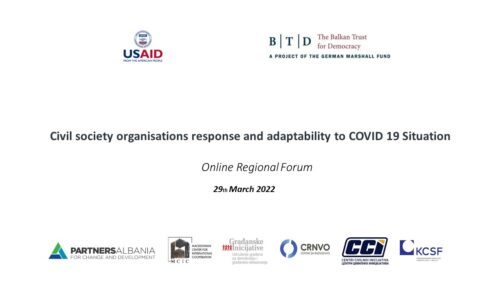
On March 29, 2022, the Centre for Development of NGOs (CRNVO) with the facilitation of Resource Centres for CSOs in the Balkan, organized an online regional forum with the participation of over 130 representatives of civil society organizations, regional networks, international organizations, academia, private sector, media, relevant state institutions and other stakeholders from Serbia, Albania, Bosnia and Herzegovina, Montenegro, Northern Macedonia, and Kosovo.
The aim of the regional forum was to analyse, identify and discuss in-depth civil sector internal situation and the enabling environment during the crisis, challenges faced, most affected areas, its resiliency and adoptability response etc thus contributing to sharing of experience, promoting of successful practices or adaptability in response to the COVID-19 outbreak. 15 international and regional guest speakers were invited to share their knowledge and experience on 3 discussion sessions, on: Impact of COVID-19 on CSOs; Communication and cooperation of CSOs and the Government in response to COVID-19 crisis and adequate examples of proper CSOs contribution in response to COVID-19. During the discussion sessions the participants emphasized the needs on having more sustainable, flexible and accessible funding for CSOs; ensuring meaningful participation of civil society in the adoption, implementation and monitoring of National Recovery and Resilience Plans; adopting the EU Civil Society Strategy; monitoring and responding to attacks against civic actors and proceeding towards a structured framework for an open, regular and transparent EU civil dialogue (to implement Art. 11 TEU).
The forum is organised in the frame of the regional project “Fostering regional cooperation and policy responses in time of crisis” implemented by 5 regional organizations serving as Resource Centre for civil society in their respective countries as, Partners Albania for Change and Development, Centre for Development of Non-Governmental Organisations, Center for Civic Initiatives, Civic Initiatives, Macedonian Center for International Cooperation and Kosovar Civil Society Foundation. The project is funded by the Balkan Trust for Democracy, a project of the German Marshall Fund of the United States and the USAID.
In the next months, 4 other Regional Thematic Forums will be organised discussing topics such Voluntarism, solidarity and philanthropy in time of crisis; Access to services during the pandemic, with special focus on marginalised groups; Covid-19 impact on Youth sector and Human rights and access to information.
The next regional forum will be organised on 27 of April, 2022 on “Access to services during the pandemic, with special focus on marginalised groups”.
[gallery size="large" columns="4" ids="eyJ1cmwiOiJodHRwczpcL1wvcmVzb3VyY2VjZW50cmUuYWxcL3dwLWNvbnRlbnRcL3VwbG9hZHNcLzIwMjJcLzA0XC8yNzc1NTQwNTdfMjA2Mzk5MDYyMzc2MDM1NV8yMzMyOTI4NTUyNjM1OTQ4NTQzX24uanBnIiwidGl0bGUiOiIyNzc1NTQwNTdfMjA2Mzk5MDYyMzc2MDM1NV8yMzMyOTI4NTUyNjM1OTQ4NTQzX24iLCJjYXB0aW9uIjoiIiwiYWx0IjoiIiwiZGVzY3JpcHRpb24iOiIifQ==,eyJ1cmwiOiJodHRwczpcL1wvcmVzb3VyY2VjZW50cmUuYWxcL3dwLWNvbnRlbnRcL3VwbG9hZHNcLzIwMjJcLzA0XC8yNzc1MjA0MDRfMjA2Mzk5MDY1NzA5MzY4NV84MzkzMDkyNDc2MTEwODUxNDM4X24tZTE2NTAwMTc4Mjc4ODYuanBnIiwidGl0bGUiOiIyNzc1MjA0MDRfMjA2Mzk5MDY1NzA5MzY4NV84MzkzMDkyNDc2MTEwODUxNDM4X24iLCJjYXB0aW9uIjoiIiwiYWx0IjoiIiwiZGVzY3JpcHRpb24iOiIifQ==,eyJ1cmwiOiJodHRwczpcL1wvcmVzb3VyY2VjZW50cmUuYWxcL3dwLWNvbnRlbnRcL3VwbG9hZHNcLzIwMjJcLzA0XC8yNzc1MjYzMzZfMjA2Mzk5MDY1Mzc2MDM1Ml80NzcxODczMDU2ODYyMzU5NzQwX24tZTE2NTAwMTc4NDI5MzcuanBnIiwidGl0bGUiOiIyNzc1MjYzMzZfMjA2Mzk5MDY1Mzc2MDM1Ml80NzcxODczMDU2ODYyMzU5NzQwX24iLCJjYXB0aW9uIjoiIiwiYWx0IjoiIiwiZGVzY3JpcHRpb24iOiIifQ==,eyJ1cmwiOiJodHRwczpcL1wvcmVzb3VyY2VjZW50cmUuYWxcL3dwLWNvbnRlbnRcL3VwbG9hZHNcLzIwMjJcLzA0XC8yNzc0NjYwNTJfMjA2Mzk5MDY2MDQyNzAxOF8yNTg3NDE1NTQyNzgyMDI2MTY2X24tZTE2NTAwMTc4NzM4NDIuanBnIiwidGl0bGUiOiIyNzc0NjYwNTJfMjA2Mzk5MDY2MDQyNzAxOF8yNTg3NDE1NTQyNzgyMDI2MTY2X24iLCJjYXB0aW9uIjoiIiwiYWx0IjoiIiwiZGVzY3JpcHRpb24iOiIifQ==,eyJ1cmwiOiJodHRwczpcL1wvcmVzb3VyY2VjZW50cmUuYWxcL3dwLWNvbnRlbnRcL3VwbG9hZHNcLzIwMjJcLzA0XC8yNzc1MjI4MzdfMjA2Mzk5MDY2Mzc2MDM1MV84ODgxMDgwNzU1MjYzMDgxMTc4X24tZTE2NTAwMTc4NTk5NjguanBnIiwidGl0bGUiOiIyNzc1MjI4MzdfMjA2Mzk5MDY2Mzc2MDM1MV84ODgxMDgwNzU1MjYzMDgxMTc4X24iLCJjYXB0aW9uIjoiIiwiYWx0IjoiIiwiZGVzY3JpcHRpb24iOiIifQ=="]

